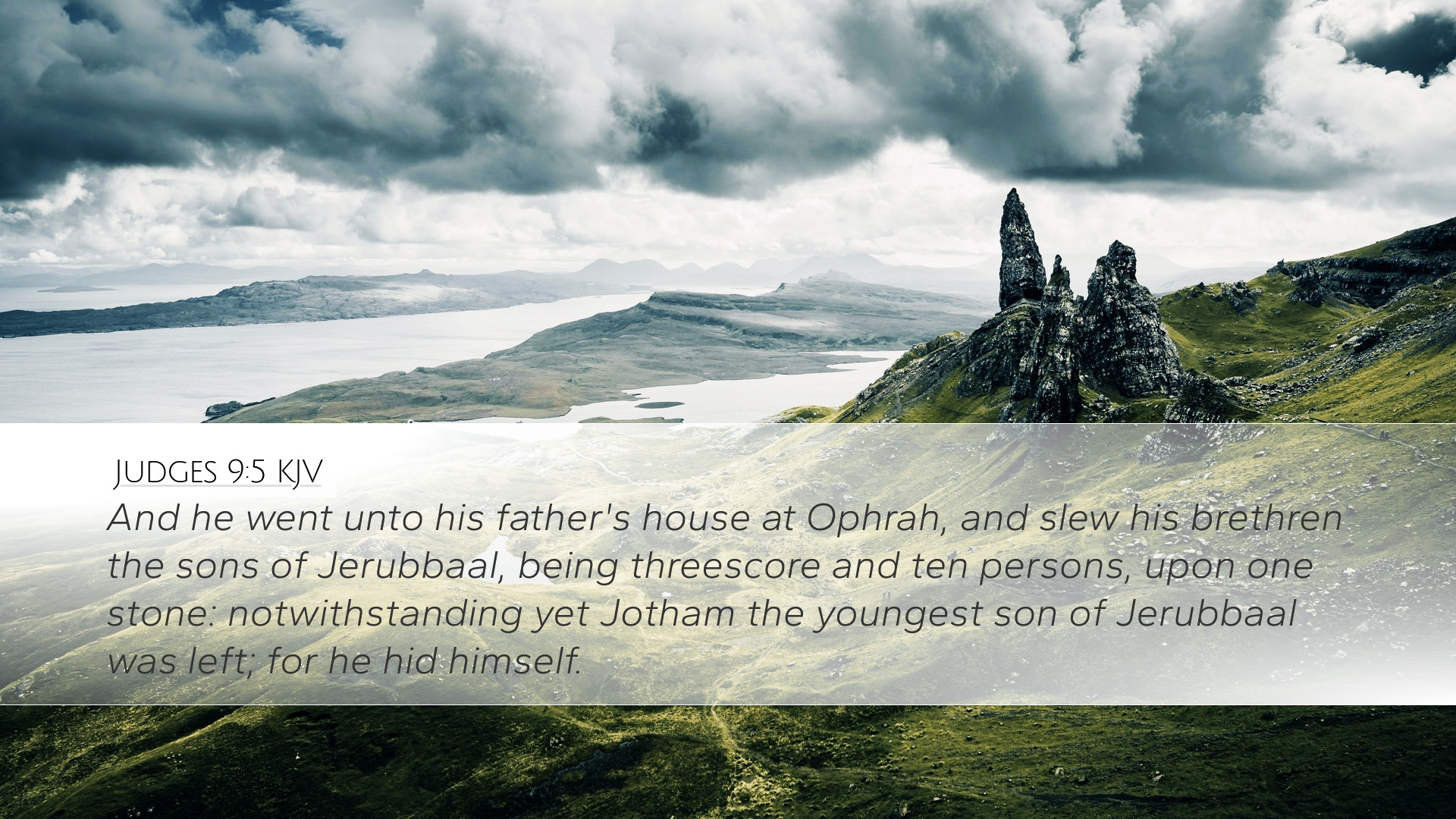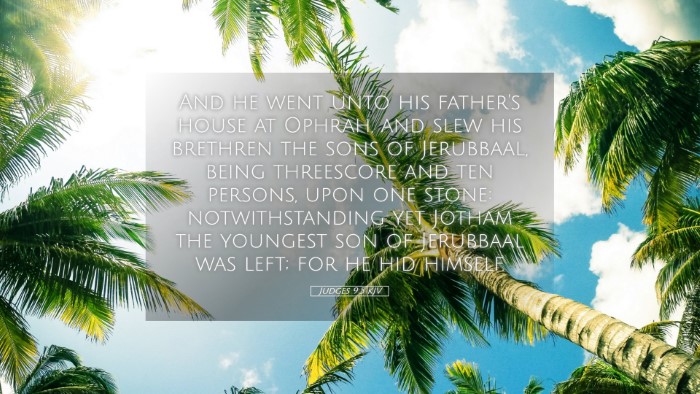Bible Commentary on Judges 9:5
Text of the Verse: "And he went to his father’s house at Ophrah and killed his brothers, the sons of Jerubbaal, except for Jotham, the youngest son of Jerubbaal; for he hid himself." (Judges 9:5)
Introduction
This verse encapsulates a moment of treachery and familial betrayal that serves as a grim turning point in Israel's history. The narrative surrounding Abimelech, son of Gideon (also known as Jerubbaal), highlights themes of ambition, power, and the consequences of sin. Commentators like Matthew Henry, Albert Barnes, and Adam Clarke provide profound insights and reflections that can guide pastors, students, theologians, and scholars in understanding the biblical and theological implications of this passage.
Contextual Background
The Book of Judges outlines the cyclical nature of Israel's faithfulness and rebellion against God. After the death of Gideon, the Israelites are vulnerable to the rise of self-serving leaders. Abimelech's rise to power, marked by fratricide, represents a critical moment in Israel's descent into moral and spiritual decline.
Matthew Henry's Perspective
Matthew Henry emphasizes the depravity of the human heart as evidenced by Abimelech's actions. He notes that despite the legacy of his father, who was a mighty deliverer of Israel, Abimelech chose a path of violence and betrayal.
- Human Nature: Henry reflects on how pride and ambition led Abimelech to commit fratricide. He notes, "Wretched men will make nothing of a crime, if it will bring them a crown."
- Divine Providence: Henry points out that Jotham's survival signifies God's protection over the faithful remnant, a theme that reflects the overarching narrative of God's covenant with Israel.
Albert Barnes' Analysis
Albert Barnes provides a more historical and contextual approach. He notes the practical implications of Abimelech's actions and the political landscape of the time.
- Political Ambition: Barnes highlights that Abimelech's massacre of his brothers was a calculated move to eliminate potential rivals. He writes, "This act was not just fratricide; it was a political maneuver to secure his claim to leadership."
- Symbolism of Ophrah: The site of this gruesome act, Ophrah, is significant as it was also the home of Gideon, illuminating the tragedy of corruption in his lineage.
Adam Clarke's Insights
Adam Clarke delves deeper into the motivations behind Abimelech's actions and the broader implications within the narrative of Judges.
- Motivations of Abimelech: Clarke argues that Abimelech's desire for power overwhelmed any sense of familial loyalty, stating, "He sought not only power but also a legacy, which he believed could only be secured through the death of his siblings."
- The Tragic Outcome: Clarke underscores the tragic irony that while Abimelech sought to establish himself as king, his actions led to the very instability and turmoil that plagued Israel afterward.
Theological Implications
The actions of Abimelech raise significant theological questions regarding leadership, morality, and the nature of God’s sovereign governance over nations.
- Authority and Morality: The quest for authority divorced from moral integrity leads to chaos. This passage serves as a warning for contemporary leaders to pursue righteousness and integrity in their roles.
- God's Justice: The eventual downfall of Abimelech serves as a reminder of God's justice. Though evil may seem to prosper temporarily, divine retribution ultimately prevails, echoing the biblical theme of reaping what one sows.
Practical Applications for Today
Pastors and educators can draw several practical applications from Judges 9:5:
- The Danger of Ambition: Reflect on the role that unchecked ambition plays in our lives and ministries, encouraging introspection about motivations and ethics in leadership.
- Importance of Accountability: Stress the need for accountability within communities and churches to prevent the rise of leaders who may act in self-interest over the common good.
- Hope in Remnant: Emphasize the significance of Jotham's survival as a beacon of hope, illustrating that God’s plans and purposes endure despite human failings.
Conclusion
Judges 9:5 challenges us to consider the implications of our actions and the motivations behind our leadership. The insights from Matthew Henry, Albert Barnes, and Adam Clarke serve as valuable tools for understanding the complexities of the text and its relevance for both ancient Israel and today's world. As we reflect on Abimelech's tragedy, may we commit to seeking Godly wisdom, integrity, and accountability in our lives and communities.


